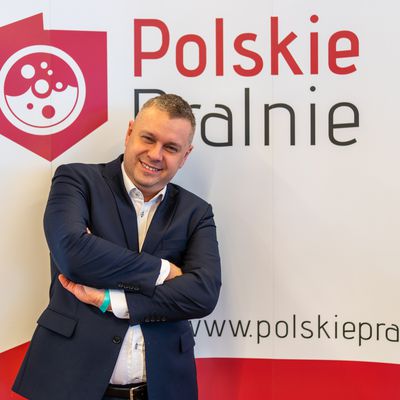
ETSA News
The latest ETSA headlines
Interview with Karol Tomczak of Fundacja Polskie Pralnie on joining ETSA
Introduction: As part of ETSA's ongoing commitment to strengthening collaboration across Europe's textile service sector, we are proud to welcome the Polish Laundries Foundation (Fundacja Polskie Pralnie) as a new national association member. Representing one of the most dynamic voices in Poland's textile care industry, the Foundation plays a leading role in promoting sustainability, practical innovation, and knowledge-sharing. We spoke with its President, Karol Tomczak who also owns the forward-thinking WashPRO laundry, about the specific challenges facing Polish laundries, the importance of accessible solutions, and how ETSA can help connect policy, industry, and everyday practice.
Question: Could you introduce yourself and your firm's core mission? What drives your approach to advancing circularity within the  industry?
industry?
I perform two roles. I am the President of the Polish Laundries Foundation - the largest organization in Poland - and also the owner of the WashPRO laundry. I built the laundry in 2019. We heat 100% of our water with renewable energy and get 50% of our electricity from solar power. We recover heat from compressors and air. The condensate from ironers fully heats the water in the laundry. I'm currently looking for a solution to recover more heat to reduce gas usage. 50% of our vehicles are electric.
Unfortunately, the government's policy in Poland regarding green energy is full of political promises, but lacks specifics and financial support for the laundry industry.
Question: Recycling is an increasingly critical part of the textile value chain. How do you see the role of advanced recycling technologies evolving in the coming years, and how does Polskie Pralnie aim to shape that future?
We want to close the water loop in our laundry, and I believe it's possible. I also want to increase production volume while saving energy. The standard we, as Europe, have introduced for "whiteness of fabrics" results in increased use of energy, chemicals, and wear on the textiles themselves. I believe society should be educated that not everything has to be snow-white, and that a stain rate of up to 4% should not be grounds for complaints. Not every beautiful apple is healthy.
Question: What motivated Polskie Pralnie to become a member of ETSA, and what are your goals for this partnership? How do you envision the future?
As an organization, I want to learn myself and also pass on knowledge to other launderers. At the Polish Laundries Foundation and WashPRO, we've opened our doors to other laundries, which unfortunately has sometimes led to unethical behavior from competitors who took advantage of it. Over 1,500 laundry owners follow WashPRO. We build our brand through honest practices, and in the future, I'd like to create a Laundry Institute in Poland, where we'd have our own school, machines, and a place for launderers, laundry staff, and mechanics to expand their knowledge. That's what led me to collaborate with ETSA on developing a program, obtaining funding, and bringing it to life.
Question: Many conversations about sustainability and innovation in the textile service industry focus on high-tech or costly solutions. From your perspective, what are the most practical and achievable steps the industry can take, especially for small and medium laundries, to promote real and scalable change? How can national and EU-level policy better support these efforts rather than contradict them?
In my opinion, the most important thing is to build a low-cost solution that can be easily financed through low-interest loans or grants. Current solutions on the market are very expensive and often just "experiments." Building a showcase laundry with solutions that anyone can view and replicate would be the ideal solution for the industry. Today, many laundries hide their innovations due to trade secrets. But if we had funding to build, demonstrate, and share these ideas - everyone would benefit. Me, other launderers, and society. Because a fast and low-cost laundry helps reduce costs and extends the life of textiles.
An example is laundry carts and covers. At WashPRO we use 100% reusable solutions, e.g. from Radom Industrial Textiles. However, I often receive requests from public clients to pack laundry in single-use plastic. On top of that, this is required in Poland by Sanepid - the health authority for accommodation facilities. So the same government that promotes green transformation and ecology contradicts itself in its actions. It's illogical. We have solutions on the market — let's use them.
Question: How important is cross-sector collaboration in scaling sustainability efforts? What role do you believe organizations like ETSA can play in accelerating progress toward a circular economy?
The most important thing is educating our clients - the end users. Currently, their knowledge is based on "what they think," not on actual facts. Facts, not opinions. Educating end users will reduce material consumption and increase tolerance for minor issues like stain quantity and color. Sometimes a torn towel is still a towel. The hole is merely in our heads... the towel still works.
ETSA: Representing textile rental companies
To find out more about our members including suppliers, national associations and research institutes click here.
ETSA: In partnership with suppliers of detergents, fabrics and machinery
To find out more about our members including textile rental companies, national associations and research institutes click here.
ETSA: Coordinating national textile service associations and working with research institutes
To find out more about our members including textile rental companies and suppliers, click here.







































